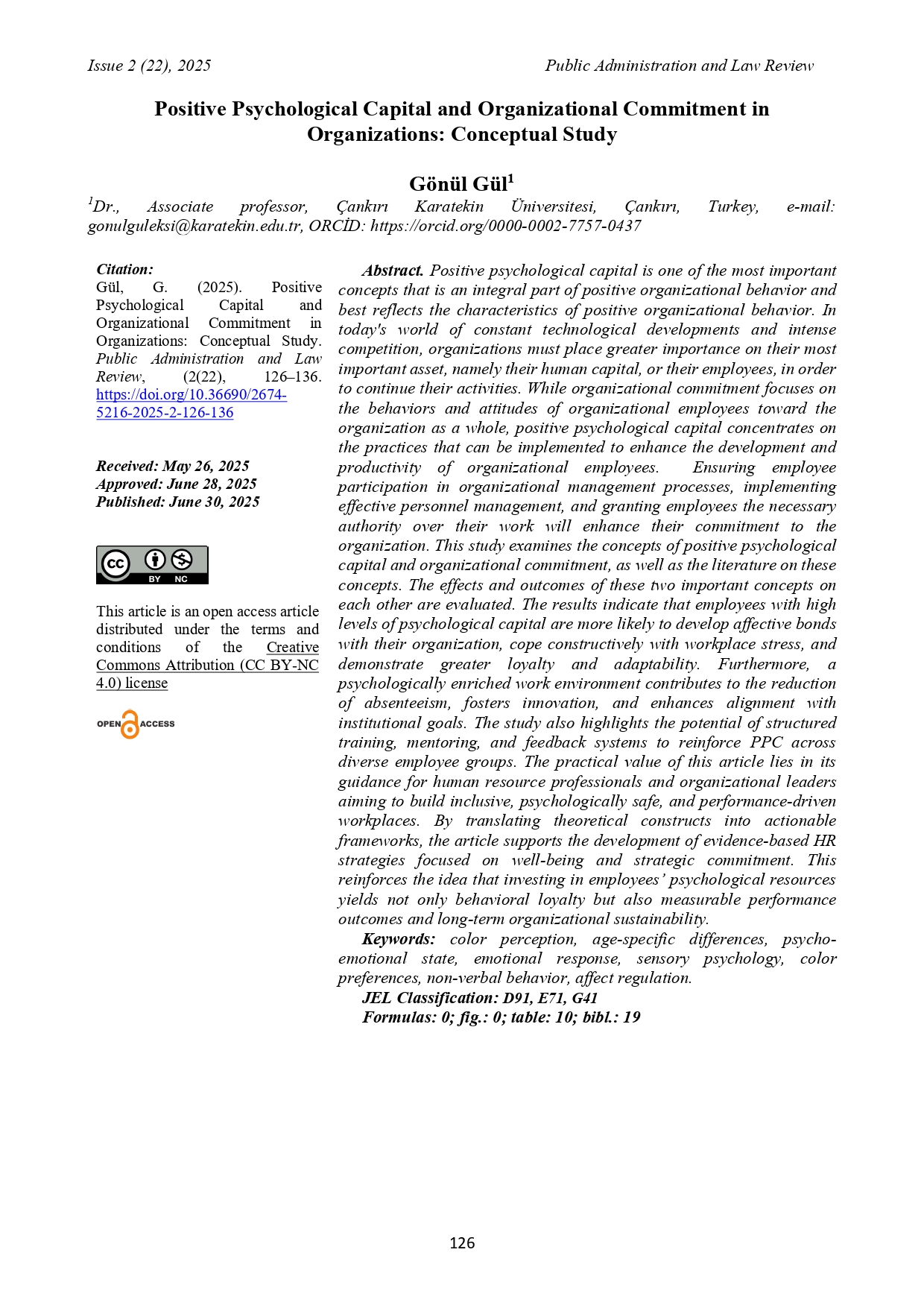POSİTİVE PSYCHOLOGİCAL CAPİTAL AND ORGANİZATİONAL COMMİTMENT İN ORGANİZATİONS: CONCEPTUAL STUDY
DOI:
https://doi.org/10.36690/2674-5216-2025-2-126-136Keywords:
psychological capital, positive psychological capital, organizational commitment, employee engagement, human resource development, workplace resilience, psychological empowerment, transformational leadershipAbstract
Positive psychological capital is one of the most important concepts that is an integral part of positive organizational behavior and best reflects the characteristics of positive organizational behavior. In today's world of constant technological developments and intense competition, organizations must place greater importance on their most important asset, namely their human capital, or their employees, in order to continue their activities. While organizational commitment focuses on the behaviors and attitudes of organizational employees toward the organization as a whole, positive psychological capital concentrates on the practices that can be implemented to enhance the development and productivity of organizational employees. Ensuring employee participation in organizational management processes, implementing effective personnel management, and granting employees the necessary authority over their work will enhance their commitment to the organization. This study examines the concepts of positive psychological capital and organizational commitment, as well as the literature on these concepts. The effects and outcomes of these two important concepts on each other are evaluated. The results indicate that employees with high levels of psychological capital are more likely to develop affective bonds with their organization, cope constructively with workplace stress, and demonstrate greater loyalty and adaptability. Furthermore, a psychologically enriched work environment contributes to the reduction of absenteeism, fosters innovation, and enhances alignment with institutional goals. The study also highlights the potential of structured training, mentoring, and feedback systems to reinforce PPC across diverse employee groups. The practical value of this article lies in its guidance for human resource professionals and organizational leaders aiming to build inclusive, psychologically safe, and performance-driven workplaces. By translating theoretical constructs into actionable frameworks, the article supports the development of evidence-based HR strategies focused on well-being and strategic commitment. This reinforces the idea that investing in employees’ psychological resources yields not only behavioral loyalty but also measurable performance outcomes and long-term organizational sustainability.
Downloads
References
Allen, D. G., & Shanock, L. R. (2013). Perceived organizational support and embeddedness as key mechanisms connecting socialization tactics to commitment and turnover. Journal of Organizational Behavior, 34(3), p.350-369. https://doi.org/10.1002/job.1805
Allen, D. G., & Shanock, L. R. (2013). Perceived organizational support and workplace behaviors. Journal of Personnel Psychology, 12(3), p.145-154.
Avey, J. B., Reichard, R. J., Luthans, F., & Mhatre, K. H. (2011). Meta-analysis of the impact of positive psychological capital on employee attitudes, behaviors, and performance. Human Resource Development Quarterly, 22(2), p.127-152. https://doi.org/10.1002/hrdq.20070
Bass, B. M., & Avolio, B. J. (1994). Improving organizational effectiveness through transformational leadership. Sage Publications.
Cheung, F., Tang, C. S., & Tang, S. (2011). Psychological capital as a moderator between emotional labor, burnout, and job satisfaction among school teachers in China. International Journal of Stress Management, 18(4), p.348-371.
Dello Russo, S., Miraglia, M., & Borgogni, L. (2017). Reducing organizational politics in performance appraisal: The role of coaching leaders for age-diverse employees. Human Resource Management, 56(5), p.769-783. https://doi.org/10.1002/hrm.21800
Luthans, F., Avey, J. B., & Patera, J. L. (2008). Experimental analysis of a web-based training intervention to develop positive psychological capital. Academy of Management Learning & Education, 7(2), p.209-221. https://doi.org/10.5465/amle.2008.32712618
Luthans, F., Avey, J. B., Avolio, B. J., Norman, S. M., & Combs, G. M. (2006). Psychological capital development: Toward a micro-intervention. Journal of Organizational Behavior, 27(3), p.387-393. https://doi.org/10.1002/job.373
Luthans, F., Youssef, C. M., & Avolio, B. J. (2007). Psychological capital: Developing the human competitive edge. Oxford University Press.
Meyer, J. P. (2016). Handbook of employee commitment. Edward Elgar Publishing.
Meyer, J. P., & Allen, N. J. (1991). A three-component conceptualization of organizational commitment. Human Resource Management Review, 1(1), p.61-89. https://doi.org/10.1016/1053- 4822(91)90011-Z
Meyer, J. P., Allen, N. J., & Smith, C. A. (2012). Commitment to organizations and occupations: Extensions and test of a three-component model. Journal of Applied Psychology, 78(4), p.538- 551.
Mowday, R. T., Porter, L. W., & Steers, R. M. (2013). Employee-organization linkages: The psychology of commitment. Academic Press.
Rego, A., Machado, F., Leal, S., & Cunha, M. P. (2012). Emotional intelligence and organizational virtuousness: Implications for individual and organizational performance. Journal of Business Ethics, 112(2), p.269-284. https://doi.org/10.1007/s10551-012-1246-1
Spreitzer, G. M. (1995). Psychological empowerment in the workplace: Dimensions, measurement, and validation. Academy of Management Journal, 38(5), p.1442-1465. https://doi.org/10.5465/256865
Story, J. S., Youssef, C. M., Luthans, F., Barbuto, J. E., & Bovaird, J. (2013). Contagion effect of global leaders' positive psychological capital on followers: Does distance and quality of relationship matter? The International Journal of Human Resource Management, 24(13), p.2534-2553. https://doi.org/10.1080/09585192.2012.744338
Youssef-Morgan, C. M., & Luthans, F. (2015). Psychological capital and well-being. Stress and Health, 31(3), p.180-188. https://doi.org/10.1002/smi.2623
Youssef-Morgan, C. M., & Luthans, F. (2015). Psychological capital and well-being: A meta-analytic review. Stress and Health, 31(3), p.180-190. https://doi.org/10.1002/smi.2623
Zhang, X., & Bartol, K. M. (2010). Linking empowering leadership and employee creativity: The influence of psychological empowerment, intrinsic motivation, and creative process engagement. Academy of Management Journal, 53(1), p.107-128. https://doi.org/10.5465/amj.2010.48037118

Downloads
Published
How to Cite
Issue
Section
License

This work is licensed under a Creative Commons Attribution-NoDerivatives 4.0 International License.





